#dialect literature
Text
Furusato wa, natsu
New item:

During summer vacation, Michio visits his father's hometown for the first time and meets a girl there. On the night of a traditional event called “Banmochi,” an arrow with a white feather flew out of nowhere. The two of them are confronted with a series of strange and bizarre gods who appear one after another to solve the mystery of the arrow. Who sent the arrow, and for what purpose? The world of the story, filled with the author's own feelings for his hometown and the charm of dialect, will captivate readers' hearts. This is a fantasy that the author has put her heart and soul into.
Shelf: 913.6 SHI (@ children's book section)
Furusato wa, natsu.
text by Shibata Katsumo ; illustrations by Kobayashi Toshiya.
Tōkyō : Fukuinkan Shoten, 2004.
ISBN: 9784834019735
179 pages : illustrations ; 16 cm.
(Fukuinkan bunko).
This work was originally published as hardcover book by Fukuinkan Shoten in 1990.
Text in Japanese with moderate furigana on kanji characters.
Book review is available in Japanese and English on “Worth sharing. Lifelong favorites” web site.

0 notes
Quote
Now I realized that not infrequently books speak of books: it is as if they spoke among themselves. In the light of this reflection, the library seemed all the more disturbing to me. It was then the place of a long, centuries-old murmuring, an imperceptible dialogue between one parchment and another, a living thing, a receptacle of powers not to be ruled by a human mind, a treasure of secrets emanated by many minds, surviving the death of those who had produced them or had been their conveyors.
Umberto Eco, The Name of the Rose
#books#literature#texts#library#dialogue#dialectic#language#quotes#Eco#Umberto Eco#The Name of the Rose
442 notes
·
View notes
Text
Filipino poet and feminist critic Lilia Quindoza Santiago has pointed out that the word for grammatical gender in the Philippines is kasarian, and already it semantically affords a little more flexibility than its Western counterpart, which is clearly and hopelessly bifurcated. Sari, repeated in Tagalog-Filipino, is sari-sari, or "all and sundry". Thus, there may well be a kind of diversity to gender that may be allowed by certain if not most cultures in the Philippines.
J. Neil C. Garcia, Performing the Self: Occasional Prose
#something about this makes me so happy#though it's a tagalog-filipino word so now i wonder what is the word for gender in other dialects in the ph#gender#queer#philippine literature#j. neil c. garcia
153 notes
·
View notes
Text
i really think the latino purists are so fucking dumb. a while ago i expressed wanting to reconnect to my indigenous heritage as a mexican person because i believe reconnecting and honoring indigenous ancestry is critical to decolonialism. and what did i get? a bunch of latinos angry as fuck because I dont “look” indigenous or that i’m too white to be indigenous, or that im just a byproduct of United Station culture and that Im a watered down mexican. Turns out from a recent dna test that almost half of my makeup is indigenous american, both Native North and Mexican indigenous. Of course the other half is portugal and Spain, but holy fuck was I happy. Finally I know that I can make the first steps to honoring that part of my ancestry, even if I will never find out what tribe or groups of indigenous people my family is from. the point is that im making those first steps, and I genuinely believe decolonization starts with learning about any and all indigenous ancestry that you may have within your family. Even if that ancestry is not positive, whether from colonization or slavery. Having that knowledge is powerful, knowing the tribes, learning their names, how to pronounce it correctly, familiarizing yourself with that culture...how is that not more important to other latinos? we come from colonization, and we seriously have to start joining our indigenous communities in honoring their presence now and in the past.
#like how r u gonna b latino and not try to learn ur indigenous ancestry#like dude thats you too!#the anti indigenous sentiments are huge in lat am either way#colorism and anti indigenous....spanish purists hating indigenous dialects or hating any change to the spanish language#like dude spanish was not the first language here first off#second off go read some spanish literature and history#transphobes dont annoy me but dumbass latinos do#like damn im rooting for us but youre making it really fucking hard#but all of the indigenous people and indigenous latinos i talk to...like we vibe and we're just trying to reconnect and honor#literally the bare minimum#and yall get mad#literally so annoying
187 notes
·
View notes
Text
Joseph (from Wuthering Heights) speaking in the Yorkshire dialect really makes me question my ability to understand any English
#literature#wuthering heights#i know its a dialect and even hard to understand for native english speakers (?) but when he spoke for the first time...damn
14 notes
·
View notes
Text
Voyage of Discovery: Hegel and his philosophical work [Part II]
“One cannot speak of an injustice of nature in the unequal distribution of possessions and resources, for nature is not free and is therefore neither just nor unjust.”
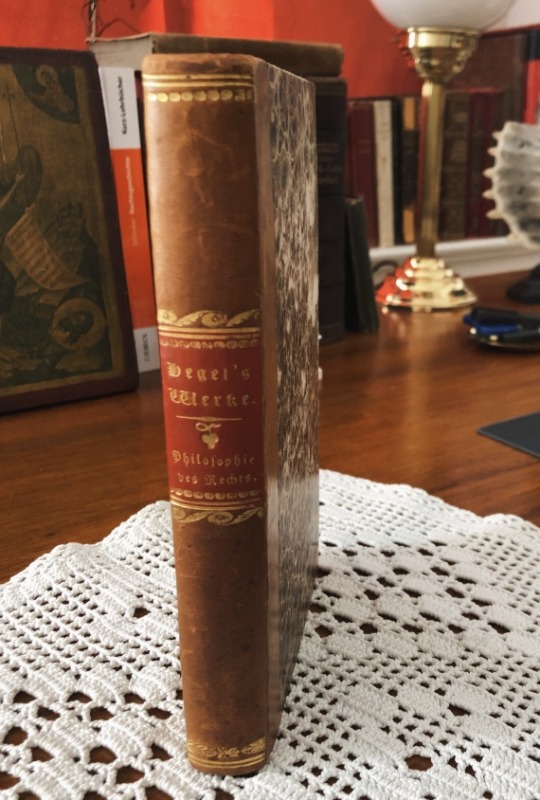
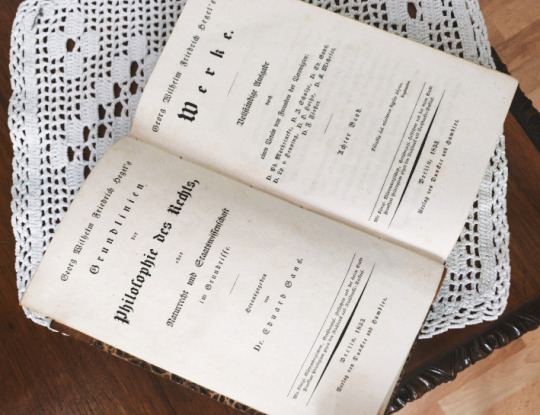
Georg Wilhelm Friedrich Hegel (1770 - 1831) published „Grundlinien der Philosophie des Rechts. Naturrecht und
Staatswissenschaft im Grundrisse“ in 1821.
In the preface he describes the idea of justice, the term of right and it's realization. The concepts of free will and freedom are interlinked to underline the theory, that the free will can only realize itself in a (reasonable) legal system.
Hegel defines “right” [Recht] as the existence of the free will in the world (PR §29). So a philosophy of right is necessarily a philosophy of freedom that seeks to comprehend freedom actualized in how we relate to each other and construct social and political institutions.
“Once the state has been founded, there can no longer be any heroes. They come on the scene only in uncivilized conditions.”

During the last few years I have repeatedly come across Hegel and his dialectics.
In the philosophy class we dealt with his dialectics in order to better comprehend Marx's understanding of history and historical materialism.
To quote Lenin: "It is impossible completely to understand Marx's Capital, and especially its first chapter, without having thoroughly studied and understood the whole of Hegel's Logic."
However, their approaches differ in certain respects, especially in their differing versions of the relation between consciousness and life.
While Hegel formulates, that consciousness determines life, Marx, on the contrary, states "(...) life determines consciousness".
So this is not only a central question of cognitive ability from an ontological point of view, but to truly understand the hierarchical opposition or relation of consciousness to the human being, vice versa.
When I was devouring Schopenhauer three years ago,
I often thought of Hegel, who was giving his lectures at the same time, which were attended far more frequently.
When I was dealing with the biography of the poet Hölderlin,
I found out that Hegel, Schelling and Hölderlin shared a room in the Tübinger Stift. Imaging how these three high spirits inspired and strengthened each other.
During my studies I encountered Hegel again in the philosophy of law and in criminal law. The spark jumped with the statement, that the criminal must be be honoured as a reasonable man, because
„Denn in seiner [des Verbrechers] als eines Vernünftigen Handlung liegt, daß sie etwas Allgemeines, daß durch sie ein Gesetz aufgestellt ist, das er in ihr für sich anerkannt hat, unter
welches er also als unter sein Recht subsumiert werden darf."
In brief: The "reasonable" criminal is breaking a rule, but at the same time, he is forming a new, possible right.
„Daß die Strafe darin als sein eigenes Recht enthaltend angesehen wird, darin wird der Verbrecher als Vernünftiges geehrt. – Diese Ehre wird ihm nicht zuteil, wenn aus seiner Tat selbst
nicht der Begriff und der Maßstab seiner Strafe genommen wird; – ebensowenig auch, wenn er
nur als schädliches Tier betrachtet wird, das unschädlich zu machen sei, oder in den Zwecken
der Abschreckung und Besserung.“
Speaking of crime as an "evil" and punishment as a form of compensating "evil" falls too short and tempts to focus too much on the intention of the criminal and thus leads to "recharge" the punishment morally and psychologically, which has no fruitful function.
Again for better understanding:
It is not the criminal who can question the law, but only
Society that recognizes infringement as a new right. It therefore requires one clarification that the (new) law set by the criminal does not apply if it should not be recognised.
Penal Theories are deffining penalty purposes, aspects of justice (cf. ius talionis "an eye for an eye, a tooth for a tooth") and are also considering the soundness of mind and how crimes can be prevented.
Hegel was a representative of Absolute Penal Theories like Kant, both advocated death penalty [!] and the central aspect "restoring justice", could not explain, why penalty is needed.
Also the Absolute Penal Theory is forbidding considerations of utility and meaning of the punishment (e.g. therapeutic offers),
explaining this view with incompatible with the "dignity and freedom of men".
Continues in the second part.
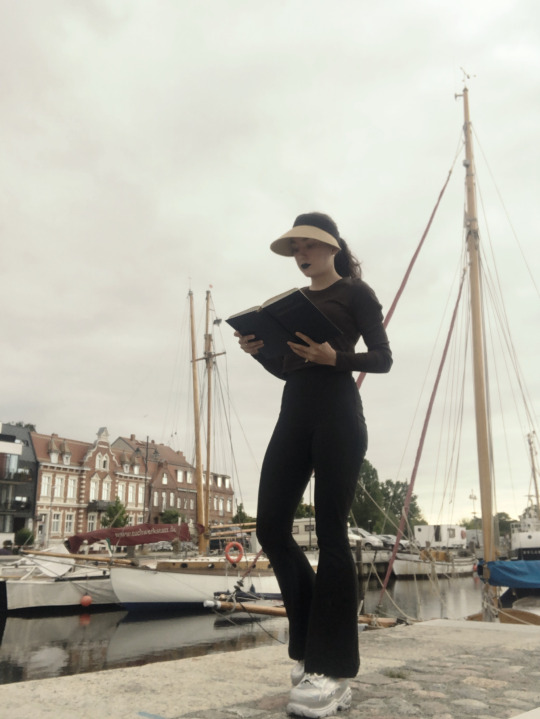


#philosophy#epistemology#ontology#dialectic thinking#dialectic method#Hegelian dialectic#georg wilhelm friedrich hegel#Hegel#antiquarian book#19th century literature#reading
5 notes
·
View notes
Text
What I read in October
Jurgen Buchmann, Γραμματική των Γλωσσών της Βαβέλ
Λουΐζα Παπαλοΐζου, το Βουνí
Δημοσθένης Παπαμάρκος, Εξημέρωση
#modern Greek literature once again being saved by its perceived periphery - the cypriots the arvanites the exiled dialects and hybridity#mine
4 notes
·
View notes
Text
#language#langblr#slang#langblog#language history#vibes#idk what to tag this as#let me know what yall think#literature#writing#aesthatic#words#word#linguistics#lingustics#dialect#dictionary
9 notes
·
View notes
Text
Only those who subject themselves utterly pass muster with the gods. The awakening of the subject is bought with the recognition of power as the principle of all relationships. In face of the unity of such reason the distinction between God and man is reduced to an irrelevance, as reason has steadfastly indicated since the earliest critique of Homer. In their mastery of nature, the creative God and the ordering mind are alike. Man's likeness to God consists in sovereignty over existence, in the lordly gaze, in the command.
Adorno & Horkheimer, Dialectic of Enlightenment (transl. E. Jephcott
#that part in dziady by mickievicz where konrad compares his writing to god's creation and tells him ''i feel and create immortality. and#you; god; what more could you do?'' but it's about science not literature this time#lmao#dialectic of enlightenment
13 notes
·
View notes
Text
would love if one day my mother let me just express my frustrations with 19th century American literature without turning it into a “your generation” lecture
#my generation is a bunch of stupid marshmallow brains I agree#but mom I’m not OFFENDED by old American literature#I just think it’s super irritating to read a slurry of stories about abuse written#in a dialect that’s very difficult to follow because it’s written exactly how it sounds#also in most ‘realism’ literature there is no virtue because all of them weren’t in the church#kajajskskskahsjdkd#I’m just tired and I’m reading five books at a time#g.txt
13 notes
·
View notes
Text
looking through my copy of eyrbyggja saga from college like goddamn maybe I do wanna go to grad school
#i miss discussing literature! & trying to read literature written in a challenging dialect!#dialect is the wrong word but im too high to think of the right one
2 notes
·
View notes
Text
On Love and Family
Recently it seems the ongoing battle between my siblings and my abusive parents has come to a head. I was always really mad at my mom mostly. But, only around college had I realized this anger was more than teenage angst. At that point, each and every instance of abuse became more searing than ever. Not to mention the physical abuse, which I still have Stockholm syndrome for.
I dealt with this by constantly reminding my mom of the trauma she had caused in my life without regard to resolving our conflict. I felt like I could finally justly terrify and torture my mom. I tried to exact the pain she had once inflicted upon me. As tempting, and possibly appropriate as it was, I refuse to operate like this again.
The things she has done and said to me are terrible, but I refuse to inflict agony someone who was abused tenfold more than me. Maybe inherited abuse was inevitable. Regardless, my mom is so much more than her worst moments.
Now, I see my little brother going through this cycle. Recently, he came out as bi. The vitriol that came out of my mom’s mouth during that time made me doubt if she ever loved us. I am really ashamed to say that I did not love her when I heard those things. If she refused to love us for who we are, who was it she was loving? And if I didn’t love who she revealed herself to be, who was I loving? Maybe morality requires that we withhold love for some people. I don’t know.
Now, I have the choice of ending my relationship with my abusive, transphobic and homophobic mom. This is not unprecedented. My mom had done the same thing with my grandma for some time. While I began writing this essay utterly unsure about my course of action, I have since been as honest as possible with my mom about my feelings and gender and intend to maintain my relationship with my mom, vacillating my distance with her as necessary.
I chose this because; not only has my mom pulled off superhuman feats of love, but I could not have been anything without her. Unfortunately, I think Hegel has something really insightful to say about this;
‘It is only in the children that the unity [of marriage] exists externally, objectively, and explicitly as a unit, because the parents love the children as their love, as the embodiment of their substance.’ (Avineri, 1972: 170-1, 178.)*
We can’t be anything without our parents. Like any phenomenologist, Hegel’s precise investigation is meant to bake every whim of human emotion into the fabric of reality. Here, I think Hegel is saying we are literally beings of love—our parents’ love. We can talk about the biology and behavior of humans, but when it comes down to it, there are reasons why we do not interact with the world under these bare assumptions.
When we assume love for our offspring, it only makes sense if the love first originates elsewhere. To explain the seemingly natural assumption that parents ought to love their children, Hegel begins from the origin of freely created love; the love partners have for each other. Hegel explains the immediate assumption of loving one’s own children as a function of this love one has for their partner. Conversely, the loving of one’s children appears in the kind of society whose couples are meant to love each other. In this kind of society, our rearing and nutrition happens only as a function of love. Love mediates our relationship between our existence and its social essence. Socialization generates the individual as a human and vice versa.
Quite literally, we are our parents’ love. Children play an active role in mediating the rearing our parents do or do not give us, but regardless; the love we require authorizes humanization. Hegel distinguishes two moments of love which make for “the most tremendous contradiction”.
‘The first moment of love is that I do not wish to be a self-subsistent and independent person and that, if I were, then I would feel defective and incomplete. The second moment is that I find myself in another person, that I count for something in the other, while the other in turn comes to count for something in me. Love, therefore, is the most tremendous contradiction.’ Philosophy of Right, addition to S 158. (Avineri, 1972: 140)*
The finding-myself and losing-myself Hegel talks about here establishes the autonomy of romantic relationships from the individuals who serve as the basis for the relationship. While not an organism or material in the strictest sense, the love becomes its own entity. Retreating from its basis, the love becomes unified for itself. This all sounds very abstract and mystical, but what I mean is; in a relationship you not only desire your partner, but also for the you that your partner requires of you. This is the positive byproduct of the two negatives Hegel proposes. Dependents or children, are precisely those beings whose basis is this kind of love; i.e. nurture. While I am unsure what Hegel would say about this, I prefer transforming the ideal basis of everything said here into a material basis. As the human bequeathed with this love, it isn’t that I am perpetually determined by it but that my very freedom is the autonomy of this love realizing itself. What you do with your parents’ love may go against everything they have told you but in the end, it is actually the emancipation of their love. Without their sum, parts never truly add. And so, while I could not have been anything without my mom, this thesis reflects my own nature over and above my mom’s. We can love our parents as we love ourselves. We can cradle our parents’ flaws as flaws that only make us human.
-Esther Alongside
*Avineri, Shlomo. Hegel's Theory of the Modern State. Kiribati, Cambridge University Press, 1974.
#blog#inspirational#writing#motivation#philosophy#literature#sapphism#transfem#families#parenting#hegel#hegelian dialectic#love#long reads
13 notes
·
View notes
Text
Apologetics and Philosophy
Apologetics is a philosophy to defend Christian faith through the exegesis of philosophical texts. Here, I would like to take up worldly philosophies and use apologetics as a lens to reinterpret it.
Plato and Christianity
Here I would like to take Plato’s theory of forms. Plato said: there is cave populated by men and it’s all dark and from the boundary of the cave men can see a beam of light and what Plato meant in this theory was beside the world of the senses there is an ideal world of forms. Let’s take Plato’s allegory from a Christian point of view: the cave represents temptation and sin and the light is the Messiah Christ who came to this world and died on the cross for the remission of sins so that all in Christ can enjoy eternity in Heaven.
Hegel and the Master Slave Dialectic
It was the philosopher who proposed the idea of the Master and the Slave dialectic. Both of them have an interrelationship one being the dominant and the other being the submissive. From a Christian perspective: the relationship that Jesus has is one of being a friend and guide. And there is a free choice of surrender or apostasy. The Master Friend dialectic is one of camaraderie and essence fulfillment. It’s an intimacy based on the forgiving and eternal love of Christ.
Nietzsche and God is dead and Dionysian and Apollonian
Nietzsche’s statement that God is dead was an iconic one and turned the tables upside down into the world of despair and doom and ushered into a Philosophy of nihilism. What I would like to say is Nietzsche’s Death of God can be compared to Christ’s crucifixion which gave all humans the will to life in eternity. Nietzsche’s Dionysian and the Apollonian as Dionysian being rhythm and beat and Apollonian being melody and harmony can be reinterpreted as Dionysian being the prodigal complex (a tendency to sin lead a profligate life) and the Apollonian (being the tendency of the Father to give the freedom of choice for either yielding to the father or being in a state of apostasy where forgiveness is guaranteed with repentance
Existentialism
Here I would like to rewrite the Philosophies of Sartre and Camus from a Christian apologetics point of view. Camus based his philosophy on the Myth of Sisyphus where Sisyphus is condemned by the Gods to roll a boulder all the way up hill only to his madness it rolls down and he is forced to do this meaningless task. From this Camus said his iconic statement that life is absurd, meaningless, monotonous, repetitive and chaotic. Looking at it from a Christian point of view: I quote Christ’s words: ‘I came to give life abundantly.’ From a postmodern Christian existentialist point of view: Life is the celebration of meaning.
Sartre’s two core philosophies are: man is condemned to be free: and hell is the other. I rewrite Sartre by saying in Christ we are privileged to be free. The other for me is Heaven as a relationship of love, empathy, and camaraderie.
Deconstruction and Reconstruction
It was the Philosopher Derrida who introduced deconstruction and in it a text is analyzed as presence and absence. From Deconstruction, I have developed a Philosophy of Reconstruction from a Christian apologetic point of view: and it is a text with the celebration of presence and the privilege and forgiveness as absence. In the text there is always a chance for the prodigal apostate to return back to the father and be embraced with love, compassion and mercy. The God of presence is a kind and merciful God and he harbors no grievance.
Kant’s Transcendental Idealism
In this Kant talks about a not-knowable-world or the noumena (spirit). Here I would like to bifurcate Kant’s transcendental idealism into transcendental realism. Kant’s transcendental idealism stands for the Father God the supreme and Kant’s transcendental realism stands for a knowable God as Christ the Messiah who came into the world: to proselytize and save people from their sins and died on the cross so that we can share an eternity with him.
#Apologetics#Christianity#Philosophy#Literature#Art#Aesthetics#Literary theory#Deconstruction#Philosophy of Reconstruction#Sartre#Kant#Hegel#Camus#Hegel's Master Slave Dialectic#Master friend Dialectic#Plato#plato's theory of forms
3 notes
·
View notes
Text
ive decided im gonna try to study traditional chinese for youuuuuu *points at yu wo shrine* <- exists mentally i do not have a physical shrine of her
#study trad mandarin for family 🚫 study trad mandarin to read the lastest books by yu wo ✅#personal#girlies i spent a literal hour crafting amessage thru google translate to reply to her post at 1 am#no i just wanted to get the grammar and the faux fluency feel from a native speaker#what i did: translate a number of existing comments under her post -> study their tone & wordings -> go thru google translate & use broken#memories of dialects ive heard from my dad’s constant stream of 24hrs mews channel and movies and when he talekd with his friends over the#phone and what my sibling uses when they speak and the movies ive watched as a kid#go thru three time of confirmation via google translate and google for the right words#meaning n stuffs#and then wee comment crafted#no ive not gone insane from studying literature for finals#maybe a little#BUT DOMINIONIONS END BOOK 7 IS LITERALLY IN THE WORKS
2 notes
·
View notes
Text
nobody asked but one of my main gripes with the whole "appalachian english is actually the closest dialect to elizabethan english so all shakespearean era actors would've sounded like modern day rednecks" (which has been debunked. so.) is that the implication is that appalachian culture and dialect has not evolved in centuries. yes, it's a culture that holds its past close to the chest. yes, there are direct influences that trace back centuries (see songs like knoxville girl that can be linked directly to specific events 400+ years ago, food that's been cooked and eaten by generations, instruments like the banjo that have evolved directly from west african music traditions, etc.) but it isn't stagnant. the culture and language has changed over time. geographic isolation or no, appalachia experiences cultural evolution like every other community.
and while it's usually a good-natured attempt to legitimize appalachian dialects as Real English and civilized, it directly references the idea that we're stuck in time and unevolving. appalachian english does not have to resemble elizabethan english to be beautiful and culture-rich and worthy of recognition. we don't have to lower ourselves to simplifications meant to make close-minded people stop demeaning the accents so many of us have been made to feel ashamed.
#hick manifesto#IT JUST GRATES AT MY NERVES AND THATS A NITPICK TRULY BUT#appalachian words are beautiful for no other reason than they're appalachian#we have rich stories in song and poem and literature both written and spoken.#nothing wrong with shakespeare. nothing wrong with shakespeare spoken in appalachian or other dialectal tongues. but they ain't the same.
10 notes
·
View notes
Note
can u talk a bit more about what you think jameson doesn't get? (I have the same impression but I've never been able to rly articulate why(
yes! absolutely! apologies for the late reply and also the essay! also, I should clarify—I don't strictly dislike Jameson: he says a lot of things that I agree with, and my opinion on The Political Unconscious has a lot more to do with my opinion on Marx than it does Jameson. for instance, I find his claim that Marxist criticism is “the absolute horizon of all reading and all interpretaton” extremely compelling. [1] like Jameson, in my own research, I find myself absolutely entranced by the infinite varieties and potentialities of Marxist theory. on a more functional level, I do use structural Marxism on like, a daily basis, so there's also that.
likewise, when it comes to Jameson's theory of literature, I also am actually obsessed with this one quote that I'd like to share:
Religion is thus here the distorted or symbolic coming to consciousness of itself, of the human community... The religious figures then become the symbolic space in which the collectivity thinks itself and celebrates its own unity; so that it does not seem a very difficult next step, if, with Frye we see literature as a weaker form of myth or a later stage of ritual to conclude that in that sense, all literature, no matter how weakly, must be informed by what we have called a political unconscious, that all literature must be read as a symbolic meditation on the destiny of community. [2]
basically, according to Jameson, religion is indeed what Bataille would describe as “the search for a lost intimacy,” which is in turn unconsciously replicated, embodied, and transformed through the literary work. [3] so to Jameson, every text is implicitly political, which is something that I agree with on a very fundamental level, and is also phrased in a very beautiful way in this passage.
that being said: Jameson rejects, in a way that is really uncomfortable for me, Marx’s dialectic, and therefore Marx’s materialism. Jameson writes (and I don’t like this):
Marxism is, however, not a mechanical but a historical materialism: it does not assert the primacy of matter so much as it insists on an ultimate determination by the mode of production. [4]
ohhh, man. look I know a lot less than you in a lot of respects but, Jameson, I am pretty sure you are wrong. throughout his entire oeuvre, Marx is deeply concerned with the sensuous world, the real and inescapable importance of matter. in his dissertation, for instance, he describes matter as a continual folding and refolding, a dialectical process which actually allows for self-awareness and the existence of the world itself. matter in motion is Marx, is the dialectic that’s so central to the entirety of his work. for instance, in the preface to Capital, he writes that the dialectic is
a scandal and an abomination to the bourgeoisie and its doctrinaire spokesmen, because it includes in its positive understanding of what exists a simultaneous recognition of its negation, its inevitable destruction; because it regards every historically developed form as being in a fluid state, in motion, and therefore grasps its transient aspect as well; and because it does not let itself be impressed by anything, being in its very essence critical and revolutionary. [5]
here’s a little diagram of the dialectic that expresses the process as a negation and elevation, production and consumption, existence and essence: [6]
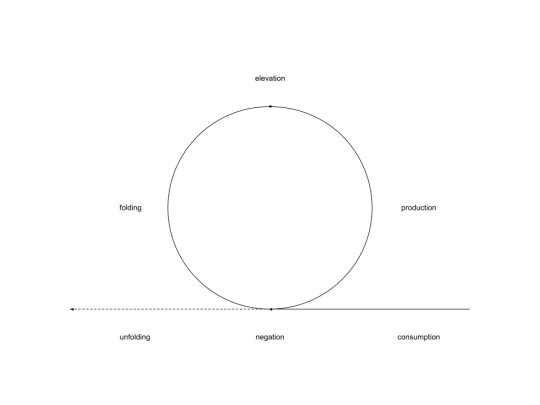
it’s an evolving, iterative process, which I think has truly transformative, radical implications for the reading of the literary text, but sadly one that Jameson appears to be largely uninterested in. instead, he is more concerned with the use of the Greimas rectangle as a hermeneutic tool. here’s an example using the sacred and profane, which I’ve filled out with various adjectives. [7]
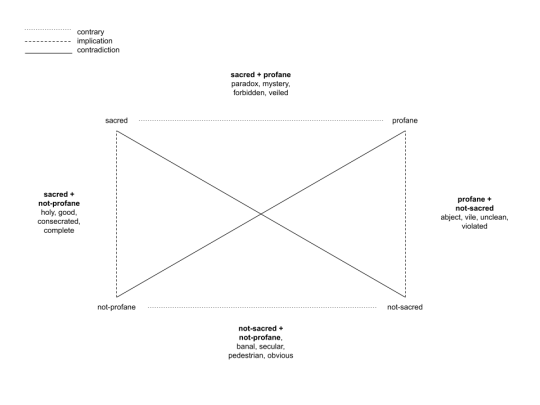
so, on a very material level, the Greimas rectangle is predicated on binary opposites and physically closed off, which should stand in sharp contrast to the image of the dialectic I’ve provided. from just a pedagogical perspective, I’ve met a lot of people who take issue with the Greimas square. like, I am not the only one who doesn’t want students to base their hermeneutical approach to literature on binary opposites and logical operators. #sorrynotsorry
Jameson does acknowledge that most Marxists view the rectangle as fundamentally anti-dialectical, but he simultaneously claims that it can be “reappropriated for a historicizing and dialectical criticism by designating it as the very locus and model of ideological closure.” [8] I take issue with the word “closure” here. the dialectic, as Marx himself understands it, actively resists closure, conclusion, neat resolution, because it is cyclical and iterative, in a state of constant motion and metabolism. as I mentioned earlier, Marx actively describes the dialectic as transient and fluid.
frankly, I feel that Jameson just doesn’t understand the potency or function of Marx’s dialectic. the kind of logical (or ideological) closure that Jameson seeks throughout The Political Unconscious is just fundamentally incompatible with Marx himself, which is deeply problematic, because this book has been used as a pedagogical tool basically since it was published. in essence, I’m truly not sure that The Political Unconscious produces truly critical, original thought, which I feel strongly should be the goal of literary theory as a discipline. if we want our students to think dialectically—and I very much think we do!—we need to actually teach the dialectic. so, tldr, I think The Political Unconscious just doesn’t fully grasp the potency of Marx’s dialectical materialism, and that makes me very sad.
Jameson, The Political Unconscious, 17.
Ibid., 70.
Bataille, "General Economy," 57. likewise, Bataille argues that man is a fundamentally religious animal, which... if you're not ripping your hair out over him giving that as a definition and then saying that... idk what to say.
Jameson, The Political Unconscious, 45.
Marx, Preface to the Second Edition of Capital, 103.
c.f. Nail, Marx in Motion, 34.
c.f. Hébert, “The Semiotic Square,” 2. if anyone has any ideas for my Greimas square... please hit me up, I desperately wanna hear them.
Jameson, The Political Unconscious, 47.
#oof this got looong#karl marx#fredric jameson#greimas square#anti-capitalism#literature#dialectics#pedagogy#asks#anon#theory#***#~~~
7 notes
·
View notes